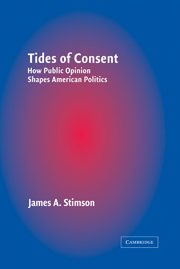Book contents
- Frontmatter
- Contents
- List of Tables and Figures
- Preface: The Shutdown
- Acknowledgments
- Tides of Consent
- 1 Opinion Flows
- 2 What the Public Wants from Government
- 3 Left and Right Movements in Preference
- 4 The Great Horse Race: Finding Meaning in Presidential Campaigns
- 5 Between the Campaigns: Public Approval and Disapproval of Government
- 6 On Politics at the Margin
- Bibliography
- Index
4 - The Great Horse Race: Finding Meaning in Presidential Campaigns
Published online by Cambridge University Press: 05 September 2012
- Frontmatter
- Contents
- List of Tables and Figures
- Preface: The Shutdown
- Acknowledgments
- Tides of Consent
- 1 Opinion Flows
- 2 What the Public Wants from Government
- 3 Left and Right Movements in Preference
- 4 The Great Horse Race: Finding Meaning in Presidential Campaigns
- 5 Between the Campaigns: Public Approval and Disapproval of Government
- 6 On Politics at the Margin
- Bibliography
- Index
Summary
Democrats were in the dumps. In the beginning of election year 2000 they had an unusually good record to run on, but a candidate they believed was a stiff. From the time of Bill Clinton's reelection in 1996, it was evident that Al Gore would seek election to the presidency in 2000 – and it was evident to most that he would lose. As election season dawned, some party leaders kept a stiff upper lip about Gore's prospects. But those who were free to speak their minds were uniform in assessing his chances as poor and in blaming the poor chances on Al Gore himself.
Gore was wooden and uncomfortable, and his proper blue suit demeanor screamed “politician” to a nation leery of politicians. The public knew little of Gore and what it knew was mainly bad news. Gore had done something unsavory, maybe illegal, in a Buddhist temple. He had done fund raising in 1996 from the White House. But more than that, he just didn't seem to have “it.” Standing beside Bill Clinton was an always unfavorable comparison for Gore. One of the most remarkable politicians of all times, Clinton's chemistry with voters seemed so nearly magical that nothing he did in office – where he set new standards for presidential embarrassment in the Lewinsky episode – seemed to matter. Gore, whose behavior was exemplary in contrast, evoked no warmth or trust.
Republicans at the same time expressed a confidence not seen since Ronald Reagan's 1984 landslide. George W. Bush raised massive sums of money the year before the campaign and consolidated the support of the Republican establishment before the primary season began.
- Type
- Chapter
- Information
- Tides of ConsentHow Public Opinion Shapes American Politics, pp. 96 - 136Publisher: Cambridge University PressPrint publication year: 2004

